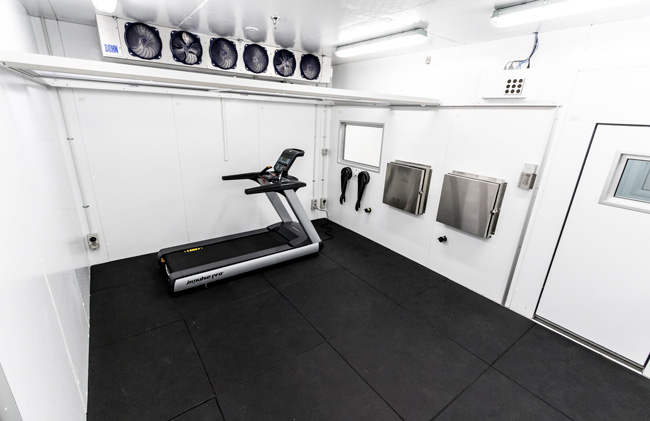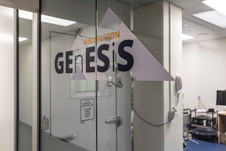
A glimpse into Wellington's new environmental simulation suite.
A new environmental simulation suite at the University's Wellington campus will help researchers test ideas such as whether modern office environments might be contributing to the world's growing obesity rates.
The Global Energetics and Environmental Simulation Suite (GENESIS) is an airtight room designed to simulate some of the more inhospitable conditions found in the world. Temperatures can be set from an icy minus 10°C through to a warm +50°C, humidity can be adjusted between 15-95 percent, and altitude conditions up to 5400 metres can be simulated.
It can also be used to simulate the high stable temperatures many office workers spend their days exposed to, due to modern technology and building design.
Under the guidance of Associate Professors Jeremy Krebs and Shieak Tzeng who were the driving force behind the suite's acquisition, Lab Manager Terry O'Donnell is using GENESIS to investigate how different temperatures influence the amount of energy that participants expend.
"Some environmental conditions may cause us to burn less energy and could be contributing to rising obesity rates."
“Obesity is caused by an imbalance between our food intake and the energy we use each day. Some environmental conditions may cause us to burn less energy and could be contributing to rising obesity rates,” Mr O'Donnell says.
This may be particularly the case in office workspaces, where people experience not only sedentary work and access to high calorie foods, but also high stable temperatures due to modern technology and building design.
Mr O'Donnell will use the suite to identify the point at which people begin to use more energy to maintain a stable internal temperature.
“I am asking participants to stay inside the chamber for two hours whilst I increase the temperature up to a warm 35 degrees, and on a second visit decrease it to a cool 11 degrees.
“Future studies will extend this time out to replicate an eight-hour working day and investigate how this concept could be implanted in a large office setting where large volumes of people could be exposed to the benefits.
“This research will help us identify the mechanisms that regulate energy balance when environmental conditions are altered. By getting a better understanding of the physiological responses, we may be able to develop more targeted obesity prevention and treatment programmes in the future.”
About GENESIS:

GENESIS helps make the CTP a premiere obesity and diabetes research facility.
GENESIS is New Zealand's first whole room calorimeter system. It is housed in the Centre for Translational Physiology (CTP) – a central biomedical research facility located at the Wellington campus.
Coupled with a new DXA scanner (which allows accurate measures of body composition), clinic rooms and a human physiology laboratory, GENESIS helps make the CTP one of New Zealand's premiere obesity and diabetes research facilities.
Many uses:
GENESIS will enable cutting-edge research on diseases such as obesity, diabetes and asthma, and also basic science investigations into thermoregulation and adaption to high altitude.
Mr O'Donnell says other researchers will use it to tackle issues including diabetes, acute mountain sickness and optimising altitude training for elite athletes.
The suite is also available to the community as an altitude or heat training facility, with watt bikes and a treadmill which can be used to train for their next big event.
Made possible by:
Procuring the suite was a collaborative effort, Mr O'Donnell says.
“It was the combined work of many Wellington research staff with crucial support from UOW management and several key external collaborators. Funding was provided through the University of Otago Internal large equipment fund and this is the first time the Wellington campus has been successful through that process.”